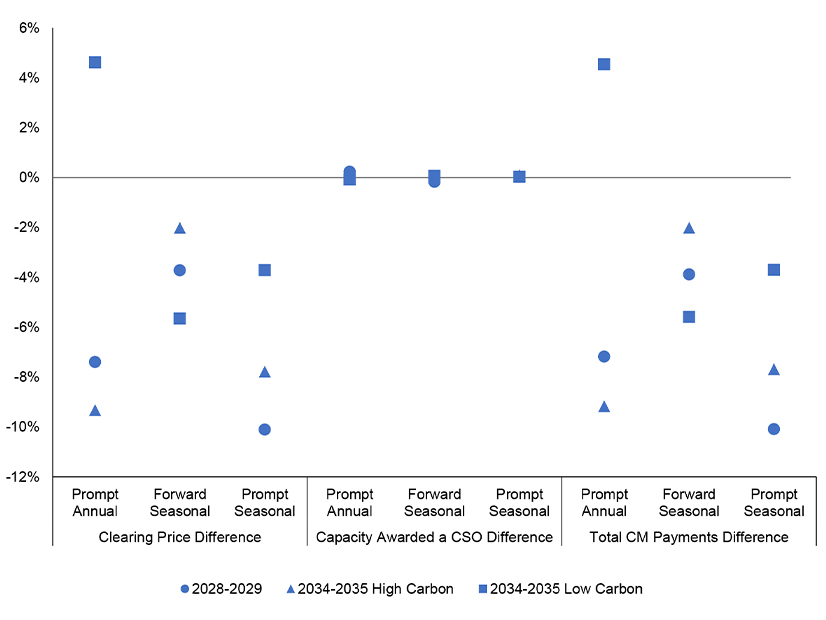WESTBOROUGH, Mass. — ISO-NE should move to a prompt and seasonal capacity market to better accommodate the evolving mix of resources and reliability risks in the region, Analysis Group told ISO-NE stakeholders at the NEPOOL Markets Committee (MC) meeting Dec. 13. The consulting firm recommended the RTO make the move for the 2028-29 Capacity Commitment Period (CCP).
In November, NEPOOL voted to delay Forward Capacity Auction (FCA) 19 — which corresponds to the 2028-29 CCP — by one year to complete resource capacity accreditation (RCA) changes and consider moving to a prompt and/or seasonal capacity market. (See NEPOOL Votes to Delay FCA 19.)
While FCAs currently are held more than three years prior to the CCP, a prompt capacity auction would be held just months before the CCP. Changing the auction to a seasonal format would break up the yearlong CCP into distinct seasons.
ISO-NE has commissioned Analysis Group to study and make recommendations on the potential move to a prompt and seasonal auction format. The study has a condensed timeline to leave time for stakeholders to contemplate the impacts of the changes. (See Analysis Group Details Methodology of ISO-NE Capacity Market Study.) The firm released its draft results prior to the December MC meeting.
Moving to a prompt and seasonal capacity market would “allow the region’s capacity market to adapt to and support the transition toward a grid of the future for the region,” Todd Schatzki of Analysis Group told stakeholders. He added the changes would “improve resource adequacy outcomes in both economic and reliability terms.”
One of the key benefits of holding the auction closer to the CCP would be more detailed information on both supply and demand, Schatzki said. It also would entail less deliverability risk for new resources coming into the capacity market, since all resources bidding into a prompt capacity market would need to be ready to provide capacity.
While the forward capacity market initially was designed to align with the development timelines of new power plants, the current timelines for new resources vary significantly between resource types, Schatzki said. While battery storage can arrive as soon as nine months, gas plants and offshore wind can take up to 48 months, he added.
A prompt auction could provide a “more neutral competitive platform for new investment,” Schatzki said.
Regarding a seasonal format, “a seasonal market can account for differences in the value of capacity in reducing reliability risks across seasons,” the draft report found. “By accounting for these differences when procuring capacity in each season, so that more capacity is procured in seasons with greater reliability risks, it can lower the costs and improve resource adequacy.”
Analysis Group performed a limited quantitative assessment of the financial impacts of the capacity market changes, which found that prompt and seasonal changes would reduce costs in most cases, with the cost benefits ranging from 2% to 10%.
The firm also found that a prompt and seasonal market likely would provide more incentives for firm natural gas fuel arrangements, because these fuel commitments often are made in the summer and fall prior to the winter.
“Compared to a prompt market, making commitments three-plus years in advance would be expected to raise costs of these commitments and reduce the scope of firm fuel arrangements,” Schatzki said, noting that the under-development RCA updates also could increase incentives for firm fuel commitments.
One basic drawback of a prompt and seasonal market would be the time and effort required to make such major changes, and administering seasonal auctions would mean more work for ISO-NE, Schatzki said.
The draft report also noted that no other regions that heavily rely on capacity markets to meet resource adequacy needs have a prompt and seasonal capacity market.
“However, other regions have, or are in the process of assessing or implementing, prompt and seasonal market designs, and the technical risks of developing a prompt-seasonal market appear manageable,” the report concluded.
Schatzki added that some aspects of the market may need to be reconsidered if the RTO elects to move to a prompt and seasonal auction to avoid unintended consequences. These include the resource qualification and retirement processes, supply offer components and market mitigation.
Looking forward, Analysis Group will present the final report at the January MC meeting, and ISO-NE is planning to make a recommendation on the capacity market changes at the February MC meeting.
RCA Updates
The MC also discussed updates to the accreditation methodology for oil and gas resources.
In the new RCA format, resources will be compared to a theoretical perfect capacity resource that lacks operating constraints. This method is intended to create a neutral point of comparison for the reliability and resource adequacy attributes of all capacity resources on the system.
In ISO-NE’s proposal, gas resources’ firm fuel arrangements will affect their accreditation value, while oil resources’ accreditation value will be affected by their storage capabilities.
Oil capacity for both oil and dual-fuel resources will be judged on an individual basis, while gas capacity will be estimated at a fleet level to account for the region’s seasonal gas constraints, ISO-NE said.
“An aggregate hourly profile will be used in the winter period to represent the hourly gas fleet generation using the daily gas available to the fleet subject to the gas system limitation,” ISO-NE said.
The aggregated gas fleet capacity value then will be allocated to individual resources, which could improve their accreditation through firm arrangements including firm gas supply and pipeline contracts, as well as added dual-fuel capabilities or LNG vaporization capabilities.
Additional firm gas contracts that reduce the total amount of gas available to the rest of the fleet would lower the accreditation values of non-contracted gas generators, ISO-NE noted.




